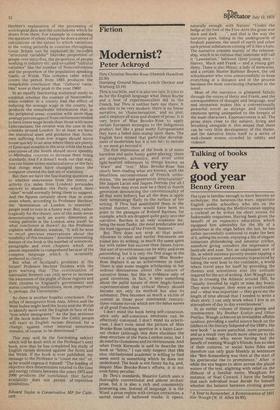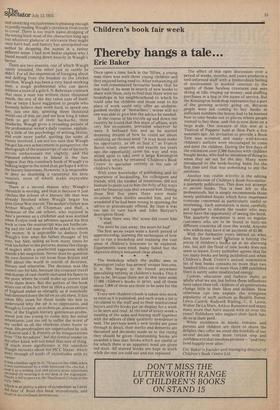Talking of books
A very good year
Benny Green
The type is familiar enough to have become an archetype; the between-the-wars expatriate English public schoolboy who sits on the terrace overlooking the Mediterranean sipping a cocktail as he writes his short stories for fashionable magazines. Having been given the benefit of an expensive education which equipped him admirably for the life of a gentleman in the reign before the last, he has rather successfully contrived to make the best of it, selling his novels, enjoying a life of elegant intinerant philandering and amateur cricket, somehow giving outsiders the impression of lassitude and ease. Not an unpleasant sort of life, in which extreme poverty means tapping a friend for a tenner, and economy is practiced by taking the next boat to the continent, a world where travel pays for itself by providing the themes and sometimes also the solitude required for the act of writing. Alec Waugh says that in crossing the Atlantic around 1931, he "usually travelled by eight or nine day boats. They were cheaper, they were as comfortable and — what was important — they gave me the length of time abroad that I needed to write a short story. I can only work when I live in an atmosphere of day to day eventlessness".
In an earlier volume of literary gossip and reminiscence, My Brother Evelyn and Other Profiles, Waugh achieved an irresistible affable candour, providing a useful source book on the tiddlers in the literary fishpond of the 1920's. His new book * is more parochial, more personal, and as a result very much more obscure to the general reader, who, never having had the benefit of meeting Waugh's friends, has no idea of their cultures, or social bona fides and therefore can only gaze blankly at sentences like "Ben Sonnenberg was then at the start of his spectacular rise to prominence." After a while the eye begins to skim across the placid waters of the text, alighting with relief on the lifebuoy of a familiar name, Maugham for instance, or Noel Coward. I have the feeling that each individual must decide for himself whether the balance between riveting gossip
and unwitting exclusiveness is pleasing enough to justify reading Waugh's chronicle from cover to cover. There is too much name-dropping of the wrong kind; most of the characters long ago lost whatever glamour or relevance they might once have had, and history has anticipated our author by dropping the names in a rather different sense. I had now better explain why 1 found myself .coming down heavily in Waugh's favour.
There are two reasons, one of which Waugh surely intended, the other just as surely he didn't. For all the impression of lounging about and drifting from the boudoir to the cricket pavilion, Waugh has been a very hard-working man, a tough professional who can quote Without a trace of a grin S. N. Behrman's remark that once a man has written three thousand words, the rest of the day takes care of itself. One or twice I have suggested to people who honestly believe they work hard, to spend one day, just one day, spinning three thousand words out of thin air, and see how long it takes them to get rid of their backache, their headache. Waugh gives a revealing picture of the professional writer's daily routine, explaining a little of the psychology of writing fiction, and even more useful, quoting the sums of Money involved. I am not too sure that Waugh has got his own achievement in perspective; the Photograph of the manuscript of one of his early novels embarrasses me slightly, and the repeated references to island in the Sun suggest that this comeback book of Waugh's is bulking larger in the mind than perhaps it will to the literary historians. However, it is impossible to deny so charming a raconteur his little vanities, most of which make enjoyable reading.
There is a second reason why Waugh's chronicle is moving, and that is because it just catches the echoes of a literary life that was already finished when Waugh began his Post-Great War travels. The author's father was Arthur Waugh, of Chapman and Hall, a bookman of the old school, who rejoiced in Alec's prowess as a cricketer and was worried When Evelyn took an advance against his first book in case the manuscript was not forthcoming and the old man would be asked to return the money. It is impossible to deduce from Waugh's text what his father thought of his sons, but Alec, telling us how many times he took his father to the pictures, denies the Charge of neglect with a unsolicited eagerness which sounds a bit suspicious. Never does he question his own decision to cut loose from Britain and drift about the world in search of diversion, literary and otherwise. The decision was the correct one for him, because the constant travel and change of cast clearly nurtured his fancy to the point where he could make up stories and write them down. But the pathos of the book arises out of the fact that in 1914 a certain type of England ended as abruptly as if somebody had slammed down the lid on an old chest. It has taken fifty years for those inside the box to Understand why the air is so oppressive, and Waugh is, 1 repeat, an archetype, almost extinct now, of the English literary gentleman-professional just too young to come into his social inheritance, just too old to suffer the worst of the racket as all the chickens come home to roost. His proofreaders are unperturbed by talk of Rosetti and S. B. Priestly or by misquotations from "The Arcadians", but the normal reader on the other hand, will not mind that sort of thing. Of much more significance is the anecdote Waugh recounts about his MCC blazer, which Went through all kinds of vicissitudes with its owner: It was a familiar sight in St. Thomas in the 1950s when it was surmounted by a wide-brimmed cha-cha hat. I used it as a writing coat and several press interviews r_ecorded my wearing it at my desk in the Algonquin. t many it fell to pieces in the MacDowell Colony in the early 1960s.
Which is as pretty a piece of symbolism as I ever did hear of. Read this book immediately, and revel in its civilised demeanour.



































 Previous page
Previous page